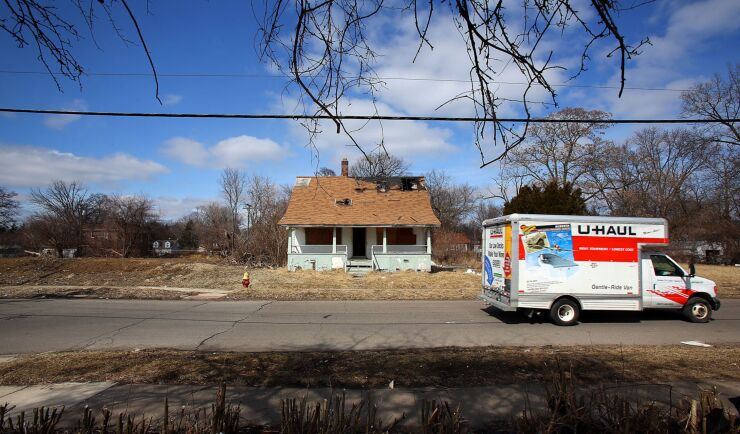Detroit voters will decide if the city will borrow $250 million to speed up blight removal after a divided City Council agreed to Mayor Mike Duggan’s revised request.
The 5-4 vote came after council members and members of the public expressed worries that the plan was being rushed after Duggan unveiled it only a week ago. By the same vote, the council rejected a week delay. Duggan’s original proposal was rejected by the council last fall.

Council president pro tem Mary Sheffield was among those pushing for more time to review the plan and possibly amend it. "This is a very complex issue and I think it warrants additional time and more engagement with the community,” she said.
Backers say the work to save 8,000 homes and demolish another 8,000 over five years is much needed and the borrowing provides the best avenue to raise the revenue especially given the drag COVID-19 has had on city revenues due to the economic shutdown.
Duggan is closing a $348 million revenue blow through the use of fund balances, cuts, layoffs, and by diverting blight and other program funding.
The city, which remains several notches below an investment grade rating, must maintain fiscal balance to avoid a return to state oversight under terms imposed as part of its exit from Chapter 9 bankruptcy in 2014. The city’s steady fiscal progress freed it from direct oversight last year.
“I'm very pleased that City Council today allowed Detroit voters to decide whether to renovate every house we can and rebuild our neighborhoods,” Duggan said in a statement.
The city plans to begin issuing bonds as soon as December if voters approve the measure Nov. 3 ballot. The plan earmarks $160 million for demolition of 8,000 homes and the rehabilitation of another 8,000. Duggan’s original plan that was rejected by the council was focused on demolition.
The plan calls for unlimited tax general obligation borrowing with 64% sold as tax-exempt and the other 36% as taxable to maintain flexibility in what the city eventually does with the rehabilitated properties. The city won’t require a tax increase to repay the borrowing as the current millage would support bond repayment as revenue is freed up from retiring debt.
If voters approve, the city’s plan calls for issuing $225 million through 2023 with room to borrow another $25 million if market conditions are favorable. The city's financial advisor, Public Resources Advisory Group, “conservatively projects” that the first piece of borrowing to be sold late this year or early next year would carry interest rates of 3.64%-5.33% with the taxable paying rates of 4.62%-6.18%, according to city documents.
The city issued its
City finance officials told council members in a response to a question on the potential market reception for the city’s bonds that “of importance for the City’s UTGO Bonds, high yield/lower rated bonds saw continued strong performance and demand in June with investors seeking lower-rated transactions to pick up additional yield.”
Duggan promoted the new plan, called “Proposal N for Neighborhood Improvement,” as both a means to fund demolition and renovations while creating jobs to keep the city’s post-bankruptcy progress on track amid the coronavirus pandemic.
The new version, crafted with council input, addresses some concerns that drove opposition by providing greater city oversight, a commitment to saving some homes and a commitment to use locally based companies. Mismanagement and a federal probe of the existing program drove some of last year’s opposition and skepticism remains among some council members.
Detroit’s fiscal progress is threatened by the fiscal toll of the COVID-19 pandemic, but the city is proactively acting to adapt its budget, S&P Global Ratings warned when it moved the city’s outlook to negative on its BB-minus issuer rating in April.
The city has demolished 21,000 vacant and uninhabitable homes since 2014 and saved another 8,000, with 22,000 vacant houses still remaining that need to be addressed, including 14,000 in need of demolition, according to a city presentation.





